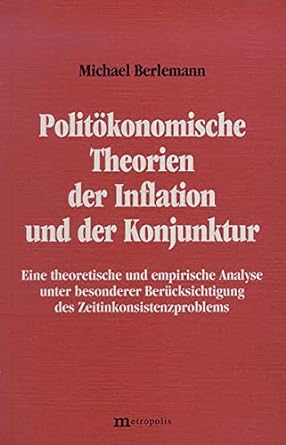
Politökonomische Theorien der Inflation und der Konjunktur. Eine theoretische und empirische Analyse unter besonderer Berücksichtigung des Zeitinkonsistenzproblems
Metropolis Verlag.
At the core of the theoretical explanations is the time inconsistency problem of monetary policy. It shows under what circumstances it occurs, what consequences result from it and what measures can be taken to alleviate it or even completely eliminate it. The focus of the analysis is the controversial approaches of inflation targeting, incentive-compatible contracts and ultra-conservative central banks.
In a further step, the time inconsistency theory is applied to a specific situation, the European Monetary Union. It is shown that the previous discussion about the Maastricht Treaty fell short and the decision in favor of a conditional contract made perfect sense. Furthermore, it is shown that the postponement debate regarding the start of the European Monetary Union also had potentially positive welfare effects.
Finally, the work provides a novel empirical investigation into the existence of political-economic business cycles, in particular the so-called “rational partisan theory”. The aspect of electoral uncertainty is explicitly taken into account as a central theoretical element of rational partisan theory and the hypothesis of the existence of partisan cycles is confirmed in the context of a multi-country analysis.

